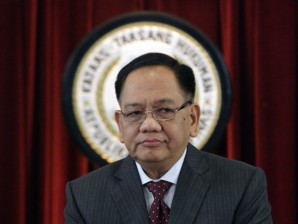MANILA, Philippine – An Associate Justice of the Supreme Court on Wednesday admitted that the congressional Priority Development Assistance Fund (PDAF) is unconstitutional based on its preliminary findings of the petition filed against it.
Associate Justice Diosdado Peralta made this admission when pressed by Senate President Franklin Drilon during the budget hearing of the Senate committee on finance whether the issuance of a temporary restraining order against PDAF was based on a preliminary finding that the fund was “unconstitutional.”
The high tribunal issued the TRO Tuesday, stopping the release of the remaining PDAF of the legislators this year as well as the release of Malampaya funds.
“In effect, there’s a prima facie finding on the part of the Supreme Court that the PDAF is unconstitutional…At least on a temporary basis, there’s a prima facie finding that the PDAF is unconstitutional just on the temporary basis that’s (why you restrained it?)” Drilon asked.
“The TRO speaks for itself. On the preliminary basis, that’s correct,” Peralta said, responding to Drilon.
“As to whether or not we will declare it unconstitutional that will be determined after the oral argument…” he said.
The oral argument on the petition questioning the legality of PDAF was set on October 8.
But Associate Justice Marvic Leonen , who was also present during the budget hearing, gave a different answer when asked of the same question by the Senate leader.
“The TRO only addresses the non-expenditure of the PDAF. Why it should not be extended…What we are only asking is that the PDAF(should) not be spent. We have not declared the legality or unconstitutionality,” Leonen said.
Drilon said the SC should decide immediately on the petition, saying that its “inaction” before the year ends would mean that it was exercising the “power to impound.”
“If you don’t decide by December 31, you in effect by that inaction is impounding on the release of these funds. Whether or not you can do that is a matter that I leave to your discretion. But that is the effect if you don’t decide this by December 31,” said the Senate leader.
“Under our system of government, the role of the executive is to release or not to release. The Supreme Court if it will not decide by December 31 exercises the power of the executive not to release,” he pointed out.
Peralta admitted that it would take time to come out with a decision on the case but agreed that it should be “terminated” before the year ends.
Leonen noted there was an “urgency” on the part of the high tribunal to resolve the case. “We are aware of the time period,” he said.
If the high tribunal would fail to come up with a decision before the year ends, Drilon then wondered if the TRO was still valid in 2014.
But Peralta pointed out that the TRO only covered the remaining PDAF allocations for 2013.
“Assuming it will appear that the same item will appear in 2014 – PDAF. Now, if you declare the PDAF unconstitutional and make your TRO permanent, that means that the PDAF for 2014 is invalid?” asked Drilon.
“We will come to that later on…” said Peralta, reiterating that the TRO covered this year’s allocations only.
“But the substance of the petitions is that the PDAF is unconstitutional and therefore if the PDAF is unconstitutional, anywhere it will appear, it is unconstitutional. Please don’t tell me that it may be unconstitutional in 2013 but it’s constitutional in 2014?” Drilon asked.
“I can’t accept that if you say that PDAF is unconstitutional in 2013, it becomes constitutional in 2014,” the senator added.
